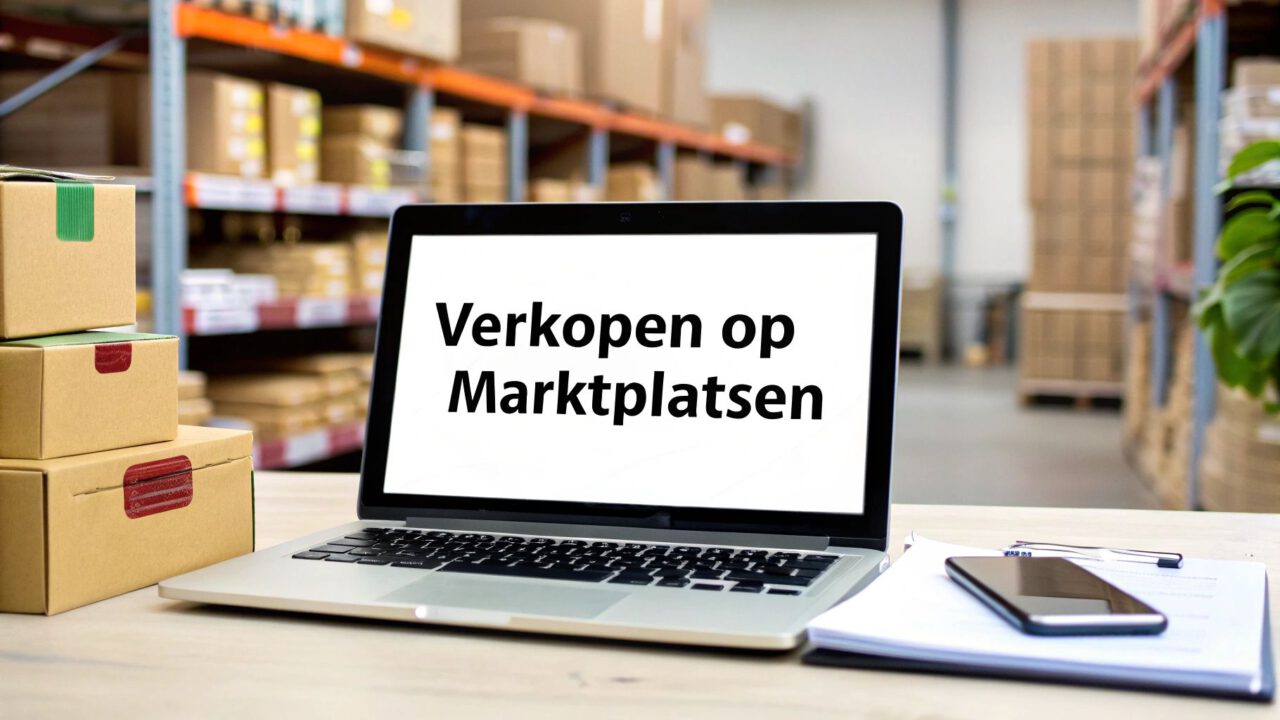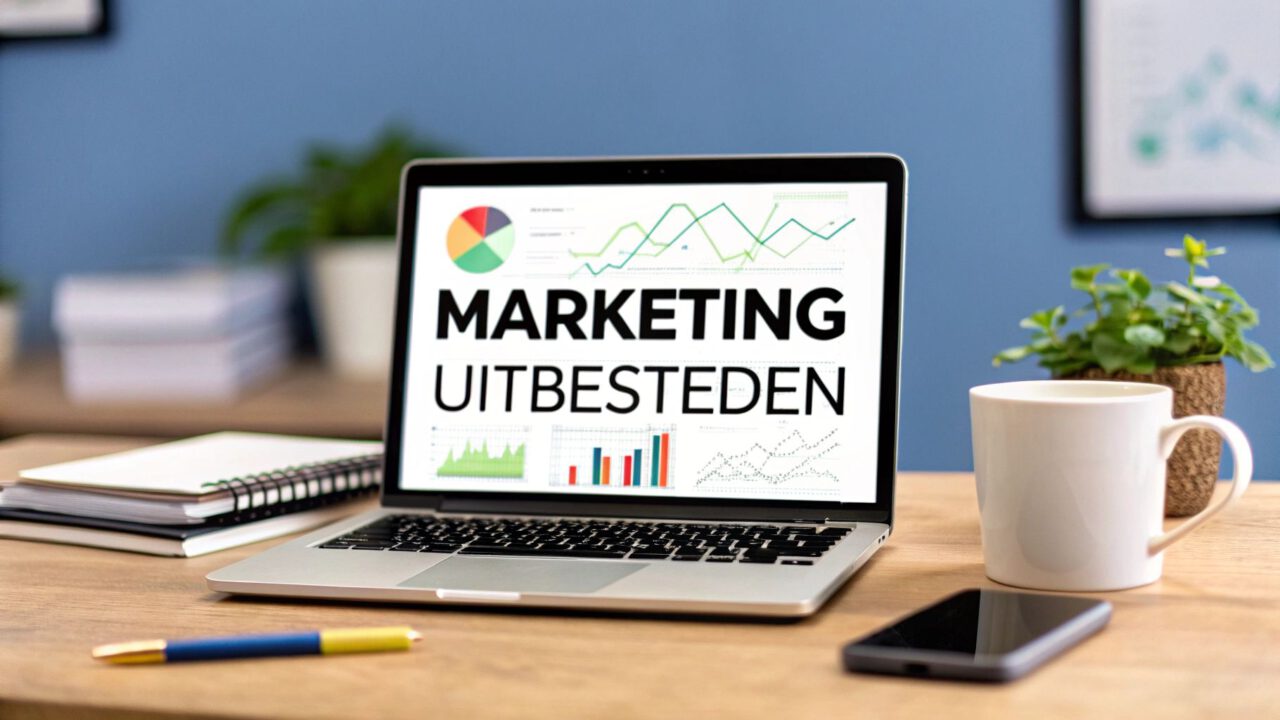E-commerce IT solutions are the digital engine of every online store. They run everything from the website itself to inventory management and payment systems. integrated approach in close cooperation This is key. Tying disparate tools together almost always leads to inefficiency and headaches. Therefore, choose a cohesive system, built with a partner who understands your business and grows with you.
Why a partner is the key to your webshop
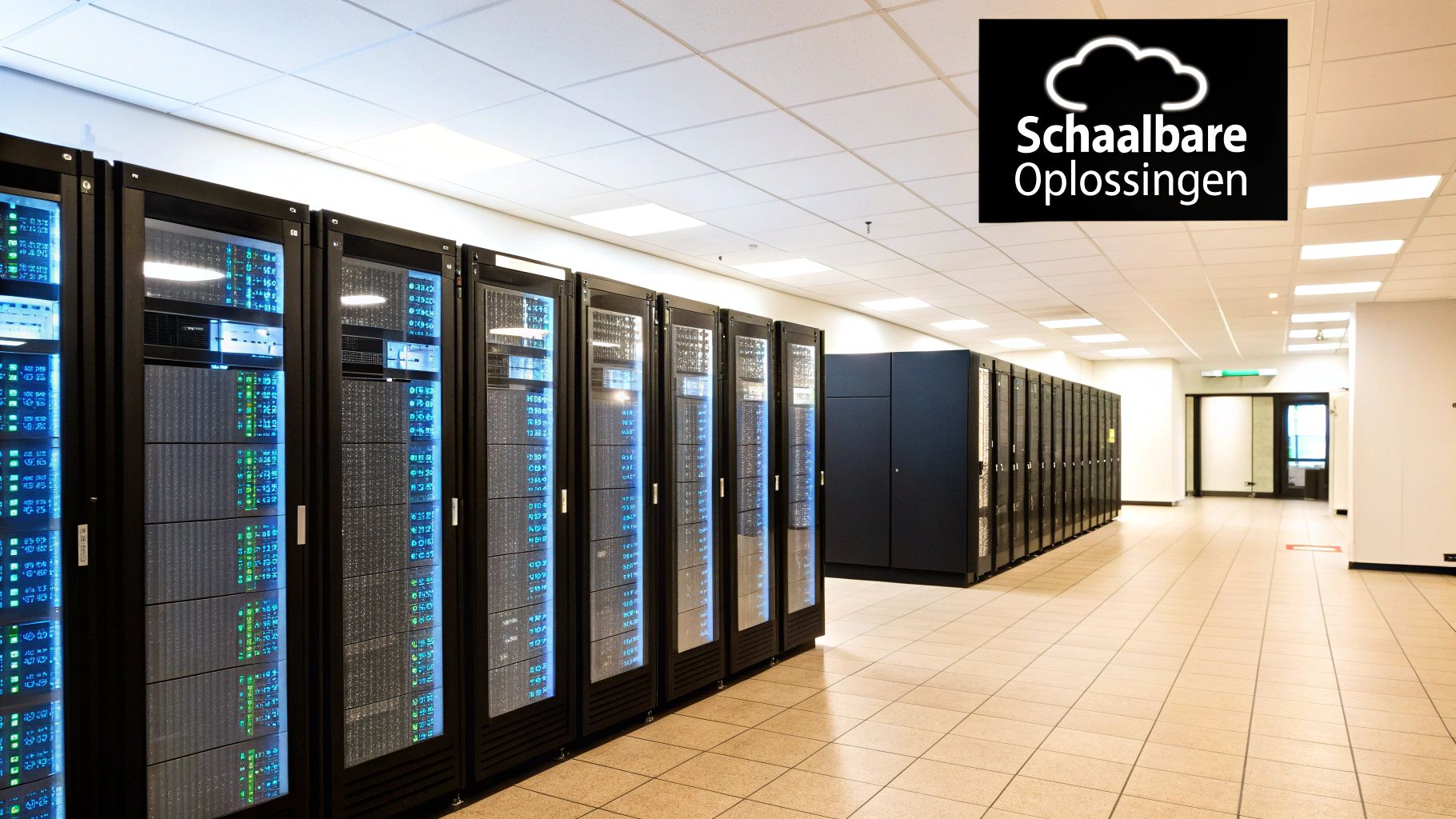
Imagine your online store as a brick-and-mortar store on a busy Belgian shopping street. The technology you choose is much more than just the checkout. It's the entire infrastructure: the foundation, the electricity, the security system, and the logistics behind the scenes.
Many entrepreneurs make the classic mistake of choosing multiple, disparate tools that might seem perfectly fine on their own. A separate tool for inventory management, a plugin for marketing, and yet another system for customer service. While this sounds flexible, it quickly leads to a chaotic mess. The result? Data scattered everywhere and manual processes that hinder smooth collaboration and hinder your growth.
The basis for sustainable growth
Achieving lasting success in the competitive Belgian e-commerce market requires a solid foundation. It's not about collecting the best apps, but about building a single, seamlessly integrated system. This system must be stable, scalable, and fully focused on providing a flawless customer experience, supported by smooth collaboration behind the scenes.
This is where the importance of the right e-commerce IT solutions And the right partner is clear. You don't need a vendor to install software; you're looking for a strategic partner who acts as a co-pilot and prioritizes collaboration.
A good IT partner is more than just a technician. They're strategic collaborators who understand your business goals and translate them into a robust digital infrastructure that enables collaboration and growth.
A partnership built on collaboration
Choosing the right partner is all about trust and a shared vision. Such a partnership ensures that your technological foundation not only works today but is also future-proof. The focus is on creating an environment where all systems communicate seamlessly, from the moment of order to doorstep delivery.
You can recognize a successful collaboration by the following characteristics:
- Shared objectives: The partner understands your commercial ambitions and proactively thinks about how technology can support them.
- Clear communication: Complex technical decisions are translated into understandable, business-friendly solutions. This guarantees smooth and easy collaboration.
- Focus on scalability: The architecture is built in such a way that it can grow with your business, without expensive and complicated restructuring afterwards.
Belgium's strong digital infrastructure offers enormous opportunities. With internet penetration of 94% and 96% of households with broadband access, connectivity is top-notch – essential for a smooth online shopping experience. More in-depth insights into the Belgian e-commerce market can be found on the website of Landmark GlobalFortunately, a professional webshop doesn't have to make this foundation unattainable. Discover in our article how costs of a complete webshop can be surprisingly affordable.
The building blocks of your e-commerce ecosystem
A modern e-commerce system is much more than the webshop your customers see. Behind the scenes, a whole ecosystem of different technologies must mesh together like cogs. The key to efficiency and growth lies not in the individual tools, but in the seamless collaboration in between.
Without this coherence, "data islands" emerge. Each system stores its own, isolated information, inevitably leading to tedious manual work, a higher margin of error, and an incomplete picture of your customer. Perfect integration, on the other hand, creates a well-oiled machine that enables efficiency, in-depth customer insights, and a flawless customer experience. This is achieved through close collaboration with an IT partner who oversees the entire picture.
The four indispensable components
While no two e-commerce ecosystems are identical, four fundamental building blocks almost always form the foundation. It's the interplay between these four that determines the success of your online business. Let's take a closer look.
-
The e-commerce platform: your digital storefront
This is the "front" of your business – the webshop itself. It's the showcase where customers browse products, find information, and make purchases. Platforms like Shopify, Magento or WooCommerce provide the foundation, but the real power lies in how this platform works together with the systems behind the scenes. -
The CRM system: your digital customer file
A Customer Relationship Management (CRM) system is the central repository of all your customer interactions. It keeps track of who your customers are, what they've bought, and how they interact with your brand. Connect your CRM to your online store, and you can suddenly personalized marketing campaigns set up and provide proactive customer service. -
The ERP system: your warehouse and accounting in one
Enterprise Resource Planning (ERP) is the operational brain of your business. This system manages inventory, processes orders, controls logistics, and handles financial administration. A seamless connection with your online store ensures accurate inventory status and automatic order processing. No more manual checks. -
Payment gateways: your digital cash register
These are the payment terminals that enable safe and reliable transactions. Solutions such as Mollie or Stripe ensure that customers can pay smoothly with their preferred methods, such as Bancontact. A flawless integration is crucial for this. customer confidence and to avoid people leaving their shopping carts at the checkout.
The danger of poor integration
Imagine this: your warehouse (ERP) has no idea what's being sold in the store (e-commerce platform). The result? Customers order out-of-stock products, leading to disappointment and cancellations. Or your customer service (CRM) has no insight into recent orders, preventing them from providing proper assistance. These are the immediate, painful consequences of systems that don't communicate with each other.
Below you will find an overview of the most important IT components, their function and the impact of a good or bad implementation.
Comparison of essential e-commerce components
An overview of the most important IT components, their functions and the impact of a good or bad implementation.
| Component | Core function | Impact on Good Integration | Risk of Poor Integration |
|---|---|---|---|
| E-commerce platform | Presenting the online shopping experience | Personalized offers, smooth purchasing process | Generic content, frustrating user experience |
| CRM system | Manage customer relationships and data | 360-degree customer view, proactive service | Fragmented data, reactive and slow support |
| ERP system | Manage inventory, orders and finances | Real-time inventory, automated order flow | Stock errors, manual order processing, delays |
| Payment gateways | Process secure online payments | High conversion, reliable transactions | Cancelled payments, security risks, loss of revenue |
As the table shows, the way the components work together is crucial for success. Expert integration, achieved by a partner who works closely with you, makes the difference between a smoothly running machine and a source of constant frustration.
Security as a foundation
Besides functionality, the security of this entire ecosystem is absolutely essential. A solid security strategy protects both your own company data and your customers' sensitive information. Without that trust, you're nowhere.
This image shows the layered approach needed to ensure security and compliance within your e-commerce ecosystem.
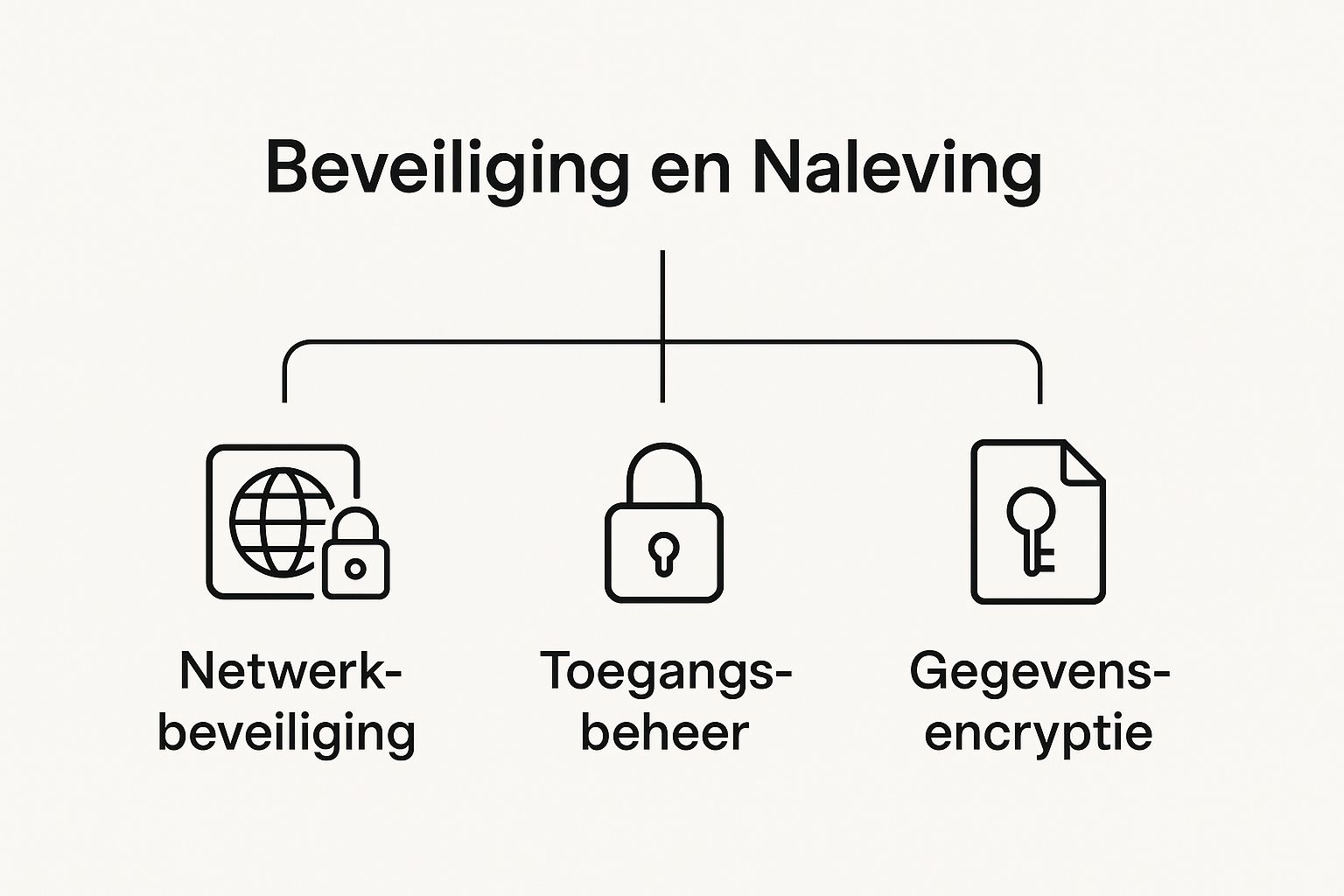
The diagram illustrates that security goes far beyond simply maintaining a secure network; it also includes strict access control and data encryption to build a robust defense.
A successful e-commerce ecosystem isn't a collection of disparate software. It's a strategically designed whole where every component works seamlessly together, supported by a reliable IT partner who facilitates your growth.
Building such a system requires expertise. An experienced partner not only helps you select the right tools but also provides the crucial glue that holds them together. This integration, achieved through smooth collaboration, transforms your webshop from a simple online store into a powerful sales engine.
Selecting the right IT partner for your webshop
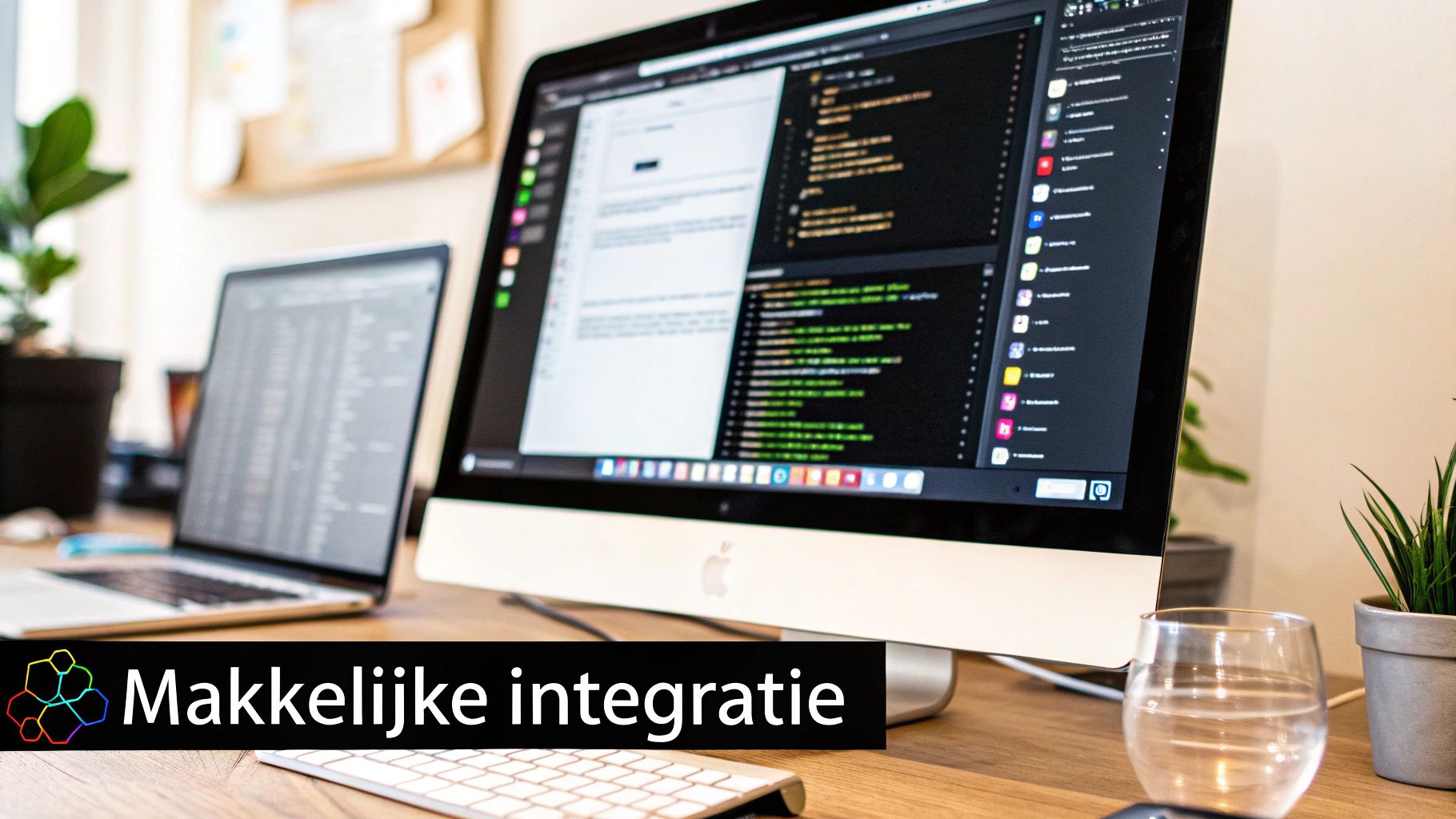
The technology behind your webshop is just the tool. The real success of your ecommerce it solutions It depends on the people who manage and continuously improve this technology. So don't view an IT partner as a vendor you pay for a product, but as a strategic ally. An extension of your own team that facilitates collaboration.
This mindset is crucial. Many entrepreneurs fixate on technical checklists and compare quotes purely based on specifications. While technical expertise is essential, the "soft" criteria are just as important for a lasting collaboration. After all, a good partnership is all about trust, clear communication, and a shared vision.
So you're not looking for an executor, but a co-pilot. A partner who doesn't just respond to your questions, but proactively thinks along with you, anticipates problems, and identifies opportunities. That's the difference between a relationship based on transactions and one built on shared growth.
Beyond the technical checklist
A good IT partner naturally has the necessary technical expertise. They know the platforms, understand the complexities of integrations, and are up-to-date on the latest security standards. But a successful collaboration goes much deeper than that. The personal connection and the ease of collaboration are often the deciding factors.
Suppose you're choosing an important business partner. You'd look beyond their resume, wouldn't you? You want to understand how they think, how they approach problems, and whether your visions align. The same logic applies to your IT partner.
The best IT partners don't act like external vendors, but as an integrated part of your team. Their success is directly linked to yours, which ensures a proactive approach focused on shared business goals and smooth collaboration.
To understand that deeper layer, you need to ask the right questions. Look beyond "Which platforms do you support?" and ask about their approach and work ethic. This will give you a much more realistic picture of what the collaboration will look like in practice.
The right questions for smooth collaboration
During the selection interviews, it's essential to gauge the candidate's working methods. The answers to the following questions will provide valuable insights into the candidate's proactiveness and communication style, which facilitates smooth collaboration.
- How do you ensure smooth and transparent communication during a project? A good response includes designated contacts, regular updates, and the use of project management tools. It demonstrates that they value structured collaboration.
- Describe a situation where you proactively solved a problem for a customer before the customer even realized it. This speaks volumes about their ability to think ahead and take responsibility – essential if you want to sleep at night.
- How do you balance technical needs with our commercial objectives? A partner must understand that technology is a means to an end, not an end in itself. They must be able to explain how their technical choices contribute concretely to your revenue growth and customer satisfaction.
A partner who invests in the relationship also takes the time to thoroughly understand your business. They're genuinely interested in your products, your customers, and your ambitions. This commitment is the foundation for a partnership that truly adds value.
A partnership for the long term
Choosing the right partner for your ecommerce it solutions is an investment in the future. The initial setup is just the beginning. The market changes, your business grows, and technology evolves. A good partner grows with you and ensures your digital foundation remains solid.
So, don't just consider the scalability of the solutions, but also the flexibility of the collaboration. Your partner must be able to respond quickly to new opportunities or unexpected challenges. This is only possible with open communication and a relationship based on mutual trust and the ease of collaboration.
A successful partnership can give your business a huge boost. Fortunately, subsidies are available in Belgium to support SMEs in this endeavor. Discover how you can finance your digital growth by exploring the possibilities of SME portfolio to investigate. This support measure can lower the threshold for investing in a professional partnership that will take your e-commerce to the next level.
Data and personalization: how to win the heart of the Belgian buyer
In the Belgian e-commerce market, a one-size-fits-all webshop is no longer enough. As consumers, we've simply become accustomed to a personalized experience. Personalization is no longer a nice-to-have, but an absolute must for standing out and retaining loyal customers. The key to this approach? Data.
Your ecommerce it solutions are the engine that collects, analyzes, and converts customer data into concrete, smart actions. Without a well-integrated system, all that valuable information remains siloed in disparate tools. You miss the essentials and miss opportunities. A good IT partner is essential in this regard.
In a partnership, your IT expert will help you choose the right systems and, more importantly, get them to communicate with each other. Think of connecting your online store to your CRM system. Suddenly, every click and every purchase tells a piece of the story, giving you a much more complete picture of your customer. It's the only way to truly listen to what your customers want.
From raw data to a shopping experience that hits the mark
A smart data strategy, developed in collaboration with your IT partner, allows you to look far beyond general demographics. You delve into your customers' real-world behavior: which products do they view repeatedly, what do they leave behind in their shopping carts, and at what point in the ordering process do they abandon?
With these insights, personalization suddenly becomes very tangible. Smooth collaboration with your IT partner can transform data into concrete results, such as:
- Product recommendations that matter: Based on previous purchases and browsing behavior, your webshop automatically shows products that the customer is likely to find interesting.
- Dynamic email campaigns: Instead of sending everyone the same newsletter, send targeted emails with offers that are truly relevant to the recipient.
- Abandoned cart reminders: A friendly, automated reminder can recoup a surprisingly large portion of that lost revenue.
The numbers don't lie. The Belgian e-commerce market volume recently amounted to approximately US$9,361 million. While the add-to-cart rate fluctuates between 8.5% and 9.0%, the abandoned cart rate around 66%. That means two out of three filled shopping carts never make it to the finish line. More about this Read insights into Belgian consumer behavior on ecdb.com.
The difference between a cry in the wilderness and a personal conversation
Imagine this: Customer A is looking for hiking boots and visits two different online stores.
Webshop 1 (the generic approach): Customer A lands on the homepage and sees the most popular products: a mix of men's, women's, and children's shoes. The recommendations are general and unrelated to their previous searches.
Webshop 2 (the personal approach): This webshop recognizes Customer A from a previous visit, when he was specifically looking for men's waterproof hiking boots. The homepage now immediately shows him a relevant selection. A little later, he even receives an email with a discount code for his favorite brand. It feels like the store truly understands him.
An online store that listens to its customers creates a sense of familiarity and relevance. This not only increases the likelihood of a purchase but also lays the foundation for a lasting customer relationship.
Collaborating with an IT partner makes all the difference. They provide the technical backbone that automates this personalization. This, in turn, helps you boost your online visibility. Learn more about how you can determine your chances of a better ranking in Google in our extensive article.
GDPR and the importance of an expert partner
Collecting and using customer data is powerful, but it also carries significant responsibility. The General Data Protection Regulation (GDPR) imposes strict rules. A violation can result in hefty fines and—perhaps even worse—a significant dent in your customers' trust.
This is where an expert IT partner proves its value once again. Through close collaboration, they ensure your data strategy not only delivers results but also fully complies with GDPR regulations. This way, you can be sure you're using data securely and respectfully, which is essential for building long-term relationships with your customers.
Logistics and inventory management: the engine behind your webshop
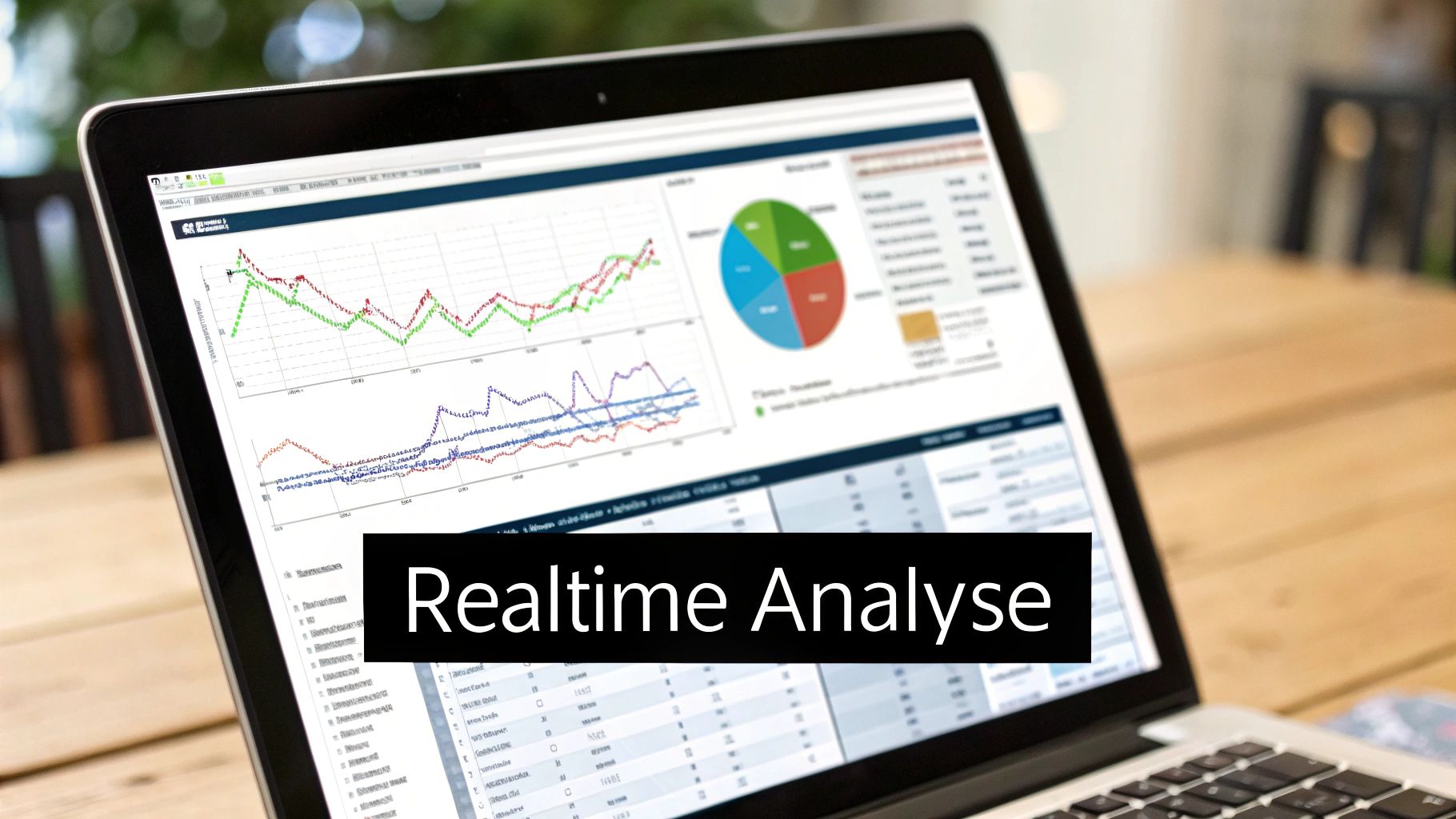
The promise you make in your online store is only truly fulfilled when the package arrives on the customer's doorstep. Fast and accurate delivery is no longer a perk; it's an absolute basic expectation that makes or breaks your customer satisfaction. This is where the backstage of your e-commerce – logistics and inventory management – plays a key role.
Many entrepreneurs see this as purely an operational task, something that "just has to be done." But the reality is that the efficiency of your warehouse is directly linked to the customer experience. An inventory error leads to disappointment, a shipping delay to frustration. The right IT solutions for e-commerce form the bridge between your digital storefront and your physical warehouse.
Your IT partner as process architect
The true power of a logistics IT system lies not in the software itself, but in how it seamlessly integrates with your unique business processes. Simply installing a standard package is rarely the answer. And this is precisely what distinguishes a true IT partner from a typical software vendor. Think of your partner as a process architect, meticulously designing the collaboration between your team and the technology.
This partner will delve into your daily workflow: how are orders picked? How are they packed and shipped? Where are the bottlenecks that cost unnecessary time and money? Together, you'll build an automated flow that's perfectly tailored to the reality of your workplace. smooth cooperation is crucial to turning technology into a real asset.
A good partner, for example, ensures a smooth implementation of a Warehouse Management System (WMS). Such a WMS is the control tower of your warehouse: it optimizes walking routes for your employees, minimizes picking errors, and gives you a crystal-clear overview of inventory at all times.
The best logistics IT solutions are the result of close collaboration. The technology should adapt to your business, not the other way around. A partner who understands this will help you automate processes that empower your team instead of frustrating them.
From real-time data to rock-solid customer trust
The most important link in modern e-commerce logistics? Real-time inventory synchronizationSimply put, this means that the inventory in your online store, in your physical store, and in your warehouse is continuously and automatically updated. When a product is sold online, it immediately becomes unavailable on all other channels.
This synchronization, expertly set up by your IT partner in close collaboration with your team, prevents the classic "no-sale" and the associated customer disappointment. It lays the foundation for reliability. But the effect extends far beyond simply providing accurate inventory.
The benefits of a smooth logistics flow are immediately noticeable to your customer:
- Reliable delivery times: Because the system knows exactly where each product is located, it can communicate a much more accurate and realistic delivery date. No more false promises.
- Proactive communication: The customer automatically receives updates when an order has been processed, shipped and is on its way, complete with tracking information.
- Efficient returns: A well-integrated system also makes the returns process much simpler and more transparent, which further strengthens customer confidence.
These elements may seem like minor details, but together they build a rock-solid reputation for reliability and professionalism. Smooth delivery and clear communication are your most powerful tools for turning a one-time buyer into a loyal, returning customer. Collaboration with your IT partner is the engine that keeps this whole machine running.
E-commerce trends in Belgium: are you ready for tomorrow?
The e-commerce market is a fast-flowing river. Those who stand still will be swept along. To remain relevant in the dynamic Belgian market, you must look beyond today's orders. e-commerce IT solutions After all, the choices you make today will determine how quickly and flexibly you can respond to new opportunities tomorrow. An agile IT architecture is therefore not a luxury, but a pure necessity.
However, this agility does not just appear out of thin air. It is created by a smart collaboration with a forward-thinking IT partnerA partner who not only handles today's implementation but also proactively thinks with you about tomorrow's trends is invaluable. It's about building a solid foundation on which you can continue to grow, no matter how consumer expectations change.
Preparing for the next wave of innovation
The future of e-commerce in Belgium is shaped by several clear trends. A successful webshop doesn't just respond to these trends; ideally, it anticipates them. Together with your IT partner, you'll develop a strategy to embrace these developments rather than simply undergo them.
What should you definitely take into account?
- Social Commerce: The lines between social media and online shopping are rapidly blurring. Your IT system needs to be able to communicate seamlessly with platforms like Instagram and Facebook, allowing customers to checkout directly where they find their inspiration. A good partner ensures a seamless and secure connection.
- Sustainability as an asset: Belgian consumers are more critical than ever and are considering the environmental footprint of their purchases. This means a demand for transparency regarding product origins, sustainable packaging, and carbon-neutral shipping options. Your IT partner can help you practically integrate this into your logistics.
- Hyper-personalization with AI: Artificial intelligence is becoming increasingly crucial for a unique shopping experience. Think of smart product recommendations that are truly relevant or dynamic pricing. A partner with expertise in AI integrations gives you a serious advantage in this area.
You won't win tomorrow's e-commerce market with yesterday's technology. A successful partnership builds a technological ecosystem and collaboration that are as agile and ambitious as your own plans.
A partnership that grows with you
The Belgian e-commerce market has exploded in recent years. Turnover recently reached €17.4 billion and forecasts point towards €24 billion. Smartphones play a major role in this: no less than 58% of all online purchases are made on mobile devices. Want to dig deeper into these figures? Then read more about the e-commerce trends in Belgium and their impact on clickforest.com.
These figures make it crystal clear: a mobile-first strategy is no longer a choice. The same goes for embracing new technology. Choosing an IT partner isn't a one-time transaction, but the beginning of a long-term relationship. The best collaboration is one where your partner knows your business inside and out and charts the path forward together with you. This is the only way to ensure your e-commerce platform not only meets today's challenges but is also ready for what tomorrow brings.
Still have questions? Here are the answers.
When you're looking for the right IT solution for your e-commerce business, you often have the same questions. Don't worry, that's perfectly normal. Let us answer a few of those frequently asked questions clearly and practically.
A standard platform or custom-made?
This is the classic trade-off. A platform like Shopify It's like a turnkey store: you get the keys quickly and can start selling almost immediately. Perfect for startups or businesses with a straightforward offering.
Customization, on the other hand, is like designing your dream home with an architect. Everything can be exactly the way you want it, ideal for complex processes, unique product configurations, or deep integrations with your existing systems. It offers a flexibility that standard solutions simply can't match.
The "best" choice? That depends entirely on your budget, your current situation, and—very importantly—where you want to go. A good IT partner won't simply force an option on you, but will work with you to determine what truly aligns with your ambitions and business goals.
What budget should I set aside for a good IT solution?
Prices vary widely. A basic online store on a platform like Shopify can be launched for just a few dozen euros per month. For a fully customized and integrated system, linked to your ERP and CRM, you should expect an initial investment that can range from a few thousand to tens of thousands of euros.
It's important not to view this as a cost, but as an investment. You're investing in efficiency, scalability, and the future growth of your business.
A reliable partner is always transparent about this. They'll work with you to develop a solution that not only fits your budget but also creates maximum value for your business.
Can't I just manage my e-commerce IT myself?
For the basics? Absolutely. Today's platforms are quite user-friendly. But the real added value of an IT partner isn't purely technical. They're your strategic sparring partner. They don't just manage, but proactively think with you about optimizations, security, and new market opportunities.
By outsourcing the complex technical aspects, you free up your hands for what you do best: running your business. For any company with serious growth ambitions, partnering with an expert IT provider is the surest path to success.
How important is knowledge of the Belgian market?
Essential. Absolutely crucial. A partner who knows the Belgian market inside and out knows exactly what local consumers expect. They understand the preferred payment methods, such as Bancontact and understand the typical logistical challenges in our country.
They can provide expert advice on local laws and the cultural details that make the difference between an "okay" webshop and one that offers a fantastic customer experience. This local expertise is essential, as it ensures your offering seamlessly matches what Belgian buyers are looking for.
Ready to take your e-commerce to the next level with a partner who speaks your language and understands your ambitions? Expert media has been standing for more than 21 years Ready to support businesses with a personalized and practical approach. Discover what a strategic partnership can do for your online store.


